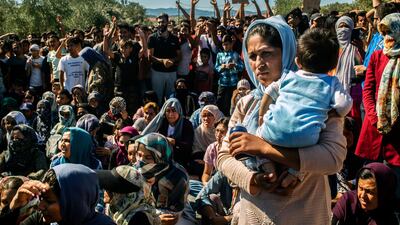For two years Iranian refugee Arash Hampay and other volunteers with the Our House humanitarian project would distribute food and clothes to homeless refugees nearly every day in Athens.
In September, however, the group stopped holding soup kitchens after police in the Greek capital started showing up and detaining people waiting in line.
"I want to help homeless people and I want to help refugees, but now, because of this situation, it is not helping," Mr Hampay, 34, told The National. Our House now hopes move the soup kitchen to a safer indoor location where they are less likely to attract police attention.
Since the right-wing New Democracy party won snap legislative elections and ousted the left-wing Syriza in July, Mr Hampay says the situation has been worsening by the day, a criticism echoed by human rights groups and watchdogs.
Just three months old, the New Democracy-led government is facing a resurgent refugee crisis, with arrivals at their highest since 2015.
Between August 2018 and September 2019, the number of refugees in Greece rose by more than 53 per cent, from 52,500 to 96,000, according to UNHCR, the United Nations refugee agency.
In response, the government evacuated several refugee squats in the capital, tightened restrictions on asylum seekers and pledged to deport more than 10,000 people by the end of 2020.
“We control our borders and always take in the hunted of this world,” Greek Prime Minister Kyriakos Mitsotakis said recently at the European Union-Arab World Summit in Athens. “But one country alone cannot carry the problems of three continents on its shoulders.”
A migration spokesperson for the Greek government office did not reply to The National's request for a comment.
As hundreds of thousands of refugees and migrants passed though Greece in 2015, many Greeks flocked to the islands where they were landing to volunteer and show their support.
Having done several stints behind bars in Iran’s Evin Prison, Mr Hampay joined 47 others, including his brother, on a flimsy dinghy that crossed the Aegean Sea in September 2016. He later received asylum.
“There was more solidarity, and there was more support,” he said of that time. “Now people are more aggressive to refugees.”
In early 2016, borders slammed shut around the Balkans, preventing the refugees from leaving Greece for other European countries. In March of that year, the European Union and Turkey struck a deal to stem the flow of refugees and migrants to Europe.
More than three years later, the EU-Turkey deal has all but collapsed, raising fears of even more arrivals. In early October, Turkish President Recep Tayyip Erdogan, angered by criticism over Turkey’s military operation in north-eastern Syria, threatened to “open the gates and send 3.6 million refugees your way”.
At the same time, a spate of recent incidents show that sympathy among Greeks has withered. Last week local officials and residents on several Aegean islands – among them Kos and Leros – blocked boatfuls of refugees from disembarking on their shores. In Vrasna, a village on the north-east coast, a group of locals egged on by far-right groups recently blocked a road into town to prevent eight buses carrying about 400 refugees from entering.
Despite Greece’s “proud history” of welcoming refugees, UNHCR spokesperson Boris Cheshirkov says “local communities must continue to show their support to refugees and the islands”.
More than 35,000 refugees and migrants are currently confined to a handful of Greek islands. The government has promised to continue relocating them to the mainland in an effort to ease the pressure on camps there.
Five thousand people live in a facility built to accommodate only 1,000 on Chios Island, and 6,000 living in a camp for 650 on Samos. In Moria, the notorious camp on Lesbos island, more than 14,000 people live in a space designed for less than 3,000.
The overcrowding has led to worsening living conditions. Thousands of asylum seekers sleep "in tents and makeshift shelters", while around "100 people use a single toilet", Mr Cheshirkov told The National.
“Among the asylum seekers are pregnant women, single parents, elderly, and people with disabilities."
The UNHCR spokesman said that with winter approaching, the agency fears the situation will get worse if not addressed urgently.
Last week, the Greek parliament passed a controversial law that makes it easier for authorities to deport failed asylum seekers, permits detention for longer periods, and rolls back protections afforded to vulnerable groups such as unaccompanied minors.
Prime Minister Mitsotakis said the law “gives a clear message: those who know they do not merit asylum but try to enter and stay in our country will no longer be tolerated”.
UNHCR and several aid groups have expressed concern that the law will also harm legitimate asylum seekers. Human Rights Watch described the measures as “a naked attempt to block access to protection” while ratcheting up deportations.
Yonous Muhammadi, president of the Greek Forum of Refugees and a former Syriza candidate for European Parliament, said the new law fits into the government’s broader “anti-migrant and anti-refugee” policy programme.
"Greece is no longer just a passage country," Mr Muhammadi, who fled Afghanistan as a refugee in 2001, told The National. "There are tens of thousands of people who want to – and have to – live here."
For his part, Mr Hampay does not blame the Greek people for the turning tide. The government, he insisted, “very clearly wants to remove us, like garbage”.

